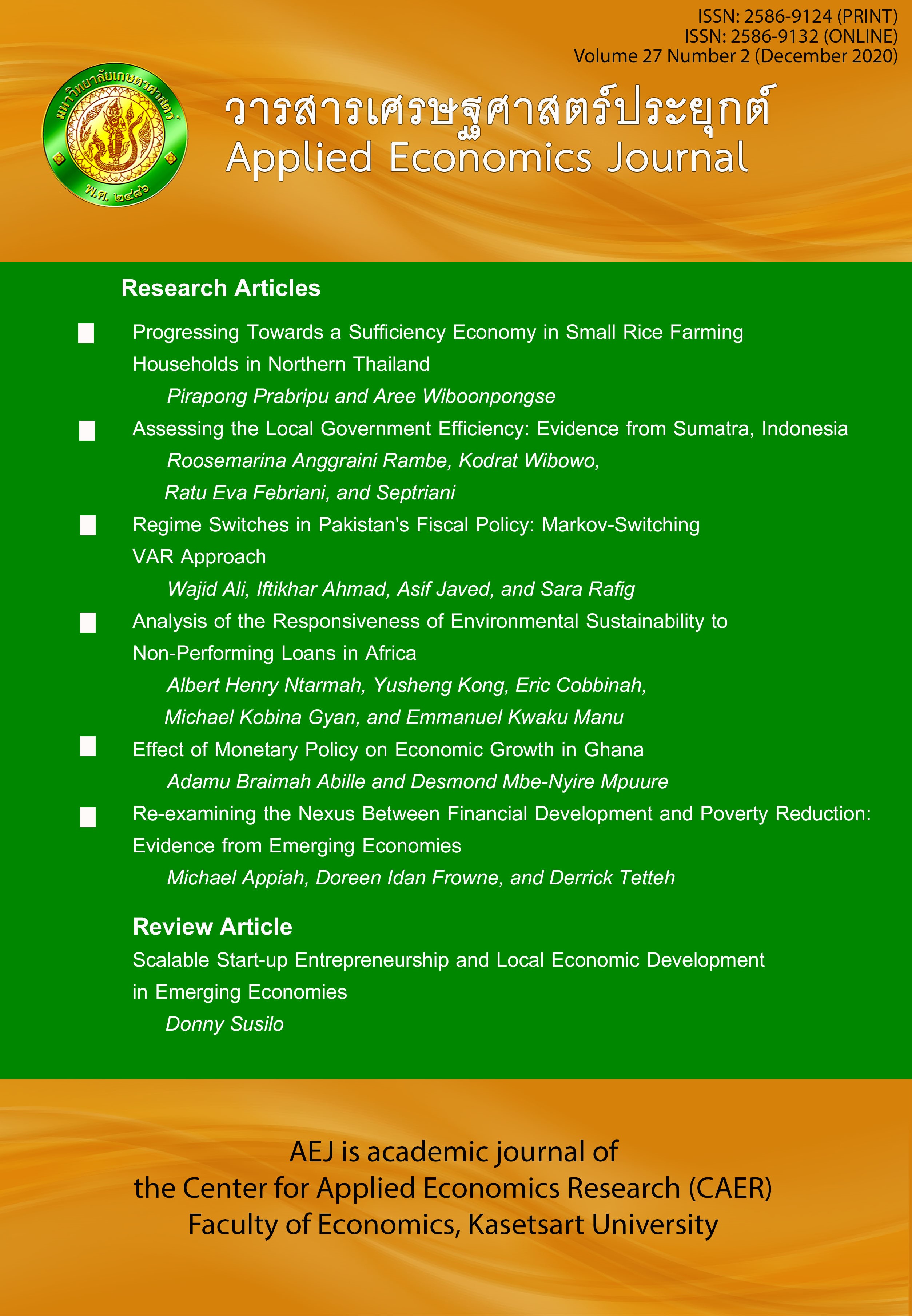Effect of Monetary Policy on Economic Growth in Ghana
Main Article Content
Abstract
This paper seeks to examine the role of monetary policy as an instrument for growth in the Ghanaian economy. The study was conducted based on yearly data from 1983 to 2017. Economic growth was the regressand in the study, with money supply, inflation, and the lending rate as the regressors. The ARDL bounds test technique was employed to investigate cointegration among the variables. The results confirmed the presence of cointegration among the variables. The results also showed the money supply as having a significant positive effect on growth in Ghana in the long run but a significant negative effect on growth in the short run. The lending rate however, was found to have an insignificant negative effect on growth in the long run but a significant positive effect on growth in the short run. Therefore, on the basis of the research findings, it is recommended that money supply be regulated in such a way that it does not lead to uncontrollable inflation, as inflation has a significant negative impact on economic growth at least in the short run, while persistent inflation in the long run is inimical to economic growth. It is further recommended that the lending rate be managed properly in order for investment to be accelerated to boost economic growth.
Article Details
The paper is published under CC BY-NC-ND, in which the article is freely downloaded and shared in its original form non-commercially and its citation details are identified.
References
Alavinasab, S. M. (2016). Monetary policy and economic growth: A case study of Iran. International Journal of Economics, Commerce and Management, 4(3), 234–244.
Anowor, O., & Okorie, G. (2016). A reassement of the impact of monetary policy on economic growth: A study of Nigeria. International Journal of Developing and Emerging Economies, 4(1), 82–90.
Babatunde, M. A., & Shuaibu, M. I. (2011). Money supply, inflation and economic growth in Nigeria. Asian-African Journal of Economics and Econometrics, 11(1), 221–237.
Bank of Ghana. (2017). Bank of Ghana anuual report 2017. Retrieved from http://www.bog.gov.gh
Blanchard, O. (2016). Macroeconomics (7th ed.). Washington, DC: Pearson.
Central Bank of Nigeria. (2011). Corporate activities of the Central Bank of Nigeria (Issue 6). Retrieved from https://www.cbn.gov.ng/Out/2012/publications/reports/rsd/arp-2011/Chapter%201%20-%20Corporate%20Activities%20of%20the%20CBN.pdf
Chaitip, P., Chokethaworn, K., Chaiboonsri, C., & Khounkhalax, M. (2015). Money supply influencing on economic growth-wide phenomena of AEC open region. Procedia Economics and Finance, 24(1), 108–115.
Dagher, J., & Kovanen, A. (2011). On the stability of money demand in Ghana : A bounds testing approach (IMF Working paper No.273). Washington, DC: International Monetary Fund.
Friedman, M. (1963). Inflation: causes and consequences. (1st ed.). Bombay: Asia Pubublishing House.
Friedman, M. (1971). The Keynesian challenge to the quantity theory. In M. Friedman (Ed.), A theoretical framework for monetary analysis (pp. 15–29). Retrieved from https://www.nber.org/chapters/c0915.pdf
Gul, H., Mughal, K. & Rahim, D. S. (2012). Linkage between monetary instruments and economic growth. Universal Journal of Management and Social Sciences, 2(5), 69–76.
Frenkel, J. A., & Johnson, H. G. (2013). The monetary approach to the balance of payments (1st ed.). England: Routledge.
Havi, E. D. K., & Enu, P. (2014). The effect of fiscal policy and monetary policy on Ghana’s economic growth: Which policy is more potent? International Journal of Empirical Finance, 3(2), 61–75.
Hussain, M. I., & Zafar, T. (2018). The interrelationship between money supply, inflation, public expenditure and economic growth. European Online Journal of Natural and Social Sciences, 7(1), 1–24.
Khosravi, A., & Karimi, M. S. (2010). To investigation the relationship between monetary, fiscal policy and economic growth in Iran: Autoregressive distributed lag approach to cointegration. American Journal of Applied Sciences, 7(3), 415–419.
Loria, E., & Ramírez, J. (2011). Inflation, monetary policy and economic growth in Mexico. An inverse causation,1970-2009. Modern Economy, 2(5), 834–845.
Merkl, C. (2008). Gali J: Monetary policy, inflation, and the business cycle: An introduction to the new Keynesian framework. Journal of Economics, 95(1), 179–181.
Obeid, R., & Awad, B. (2017). Effectiveness of monetary policy instruments on economic growth in Jordan using vector error correction model. International Journal of Economics and Finance, 9(11), 194–206.
Ofori-Frimpon, K. (2017). The impact of money supply on inflation, a case of Ghana. Imperial Journal of Interdisciplinary Research, 3(1), 2312–2318.
Omodero, C. O. (2019). The role of money supply in economic growth enhancement: The case study of Nigeria. Journal of Business School, 2(2), 71–78.
Ovat, O. O. (2016). Commercial banks’ credit and the growth of small and medium scale enterprises: The Nigerian experience. Journal of Economics and Finance, 7(6), 23–30.
Pigou, A. C. (1936). Mr. J. M. Keynes’ general theory of employment, interest and money. Economica New Series, 3(10), 115–132.
Precious, C. (2014). Impact of monetary policy on economic growth: A case study of South Africa. Mediterranean Journal of Social Sciences, 5(15), 76–84.
Quah, D., & Vahey, S. P. (1995). Measuring core inflation. The Economic Journal, 105(432), 1130–1144.
Quartey, P., & Afful-Mensah, G. (2014). Financial and monetary policies in Ghana: A review of recent trends. Review of Development Finance, 4(2), 115–125.
Ruzima, M. & Veerachamy, P. (2016). Impact of inflation on economic growth: A survey of literature review. International Multidisciplinary Research Journal, 5(10), 1–9.
Srithilat, K., & Sun, G. (2017). The impact of monetary policy on economic development : Evidence from Lao PDR. Global Journal of Human-Social Science: Economics, 17(2), 9–15.
Twinoburyo, E., & Odhiambo, N. (2018). Monetary policy and economic growth: A review of international literature. Journal of Central Banking Theory and Practice, 7(2), 123–137.
Ufoeze, L. O. (2018). Effect of monetary policy on economic growth in Nigeria: An empirical investigation. Annals of Spiru Haret University, Economic Series, 9(1), 123–140.


